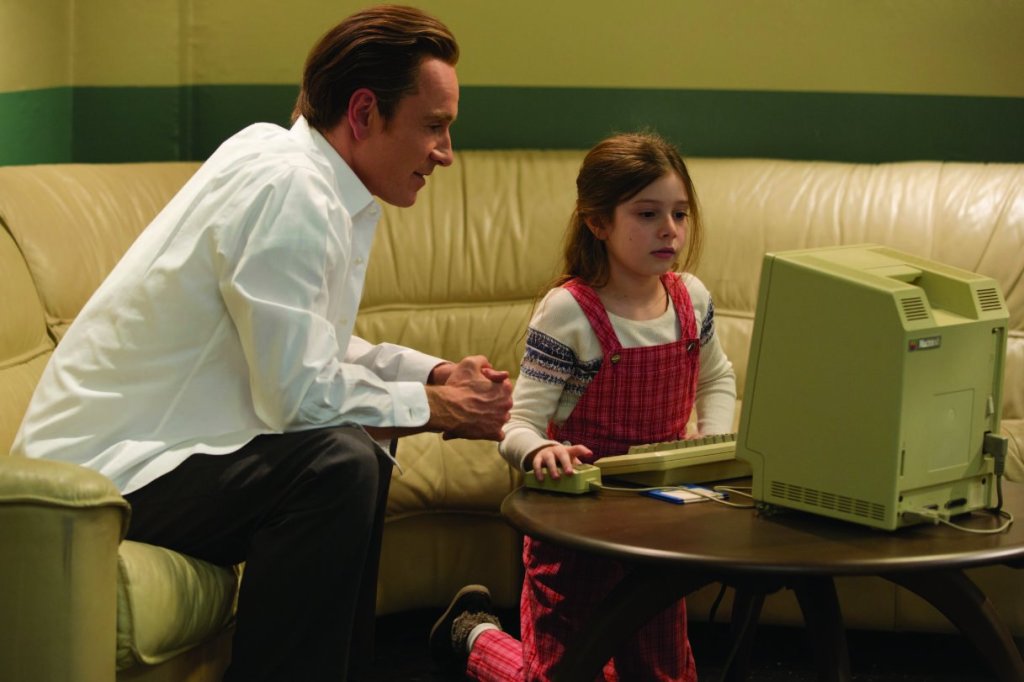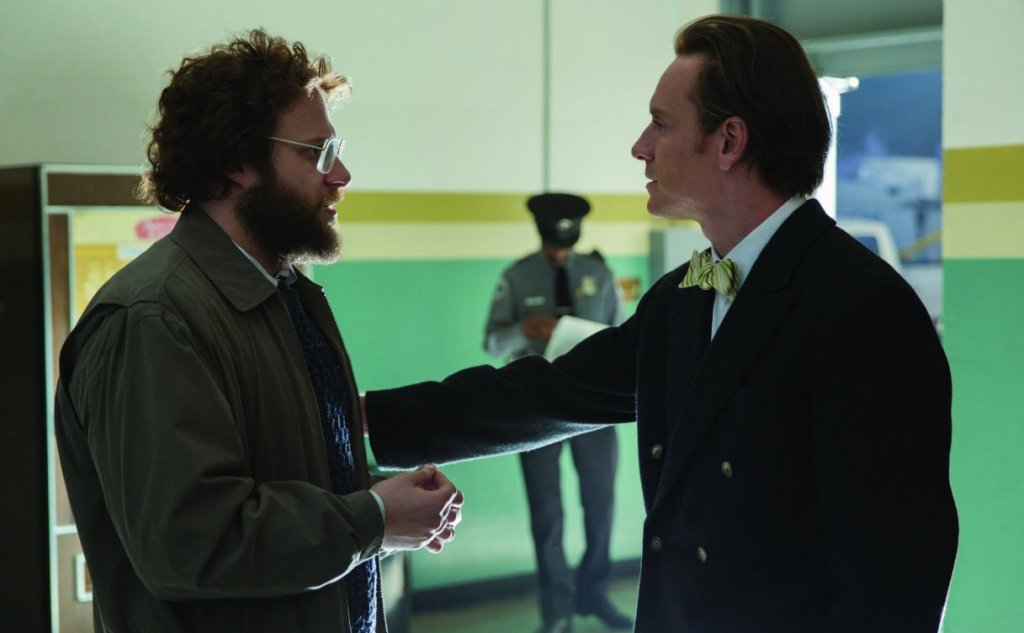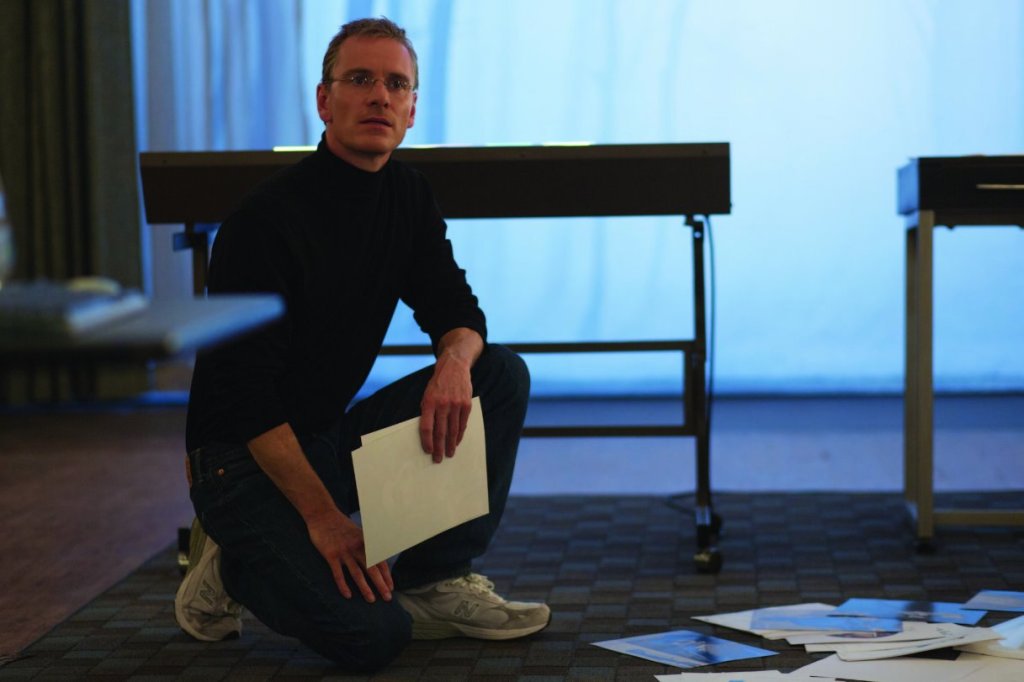Despite not being an Apple devotee myself, there is no denying the impact upon the modern world of Steve Jobs. He was a titan and a pioneer, and left a lasting imprint on computers, music, phones, and several other industries. Danny Boyle’s biopic is based on the biography that came out weeks after Jobs’ death back in 2011, with the screenplay written by Aaron Sorkin. Steve Jobs features considerable talent in front of the camera as well, and sheds light on the genius of the man, as well as his drive to succeed, and the difficulty of working for an innovative genius.
The film is focused on three major scenes set in 1984, 1988, and 1998. All three take place back stage before major product launches of the Macintosh, NeXT, and iMac computers, respectively. All three vignettes involve backstage interactions between Steve Jobs (Michael Fassbender) and important people in his professional and personal life: The head of marketing and the person closest to Steve, Joanna Hoffman (Kate Winslet); Steve Wozniak (Seth Rogen), his Apple co-founder and creator of the Apple I and Apple II; Andy Hertzfeld (Michael Stuhlbarg), a member of the original Macintosh team; John Sculley (Jeff Daniels), the CEO of Apple who would eventually become known as the man who fired Steve Jobs; and his ex-girlfriend, Chrissann (Katherine Waterston), and their daughter, Lisa Brennan (played at 5 by Mackenzie Moss, 9 by Ripley Sobo, and at 19 by Perla Haney-Jardine) with whom he has a rocky relationship.
Every single one of these glimpses behind the curtain shows a flurry of activity, sometimes struggling to get something working, like the first Macintosh saying “Hello” during the presentation, to Steve finally deciding the 37th shark picture is the best one for the presentation. Steve Jobs is a man with high expectations and has a clear vision for everything that he wants his company to be doing. He casts a vision and drives the people around him to reach for that vision together. As he puts it to Wozniak when Woz asks what it is that Steve Jobs does, he says, “I play the orchestra.” What comes through in Fassbender’s depiction of Jobs is that he is not just a big picture guy; he cares very much about the details and the minutia, maybe even too much, and sometimes to the detriment of the interpersonal relationships in his job.
Winslet’s Hoffman (and her on-again-off-again Polish accent) is the only person who can seemingly connect with him and get through to him on any regular basis, and is someone who is able to cut through his BS, as he uses his intellect as a deflection tool to shut down other’s comments and criticisms. In 1984 he is reluctant to acknowledge Lisa as his daughter, and in the other years, when he has difficulty either connecting with his daughter or getting her to come back stage to talk to him, it is Hoffman who is able to get through to him about what he should do for his daughter, why she asks him questions, and why he needs to make things good with her.
Aside from the usually good Sorkin dialogue, there are major themes of control and how to be a good person when you are such a demanding personality and strive to achieve big things. Sorkin does well to weave these into the dialogue, alluding to past issues with adoption and abandonment as a child through Steve’s conversations with Sculley. These issues also bleed into relationship with Woz. Even though they have a tumultuous relationship, they remain friends and colleagues, and are able to challenge one another on important issues, which manifests itself in Woz confronting him and insisting that Steve acknowledge the people who worked on the Apple II because it is the right thing to do, but is something Steve refuses to do because it looks backward and is counterproductive to his plans. This discussion starts in 1984 and continues through to 1998, producing the best line of the film when Wozniak, fed up with Jobs, exclaims, “It’s not binary. You can be decent and gifted at the same time.”
This is the crux of the film, the lesson that Fassbender’s Jobs spends the film learning, through his interactions with the people who work for him, and in his relations with his daughter and her mother. For all of his brilliance and savvy as a businessman, nearly all of these relationships are testy and volatile. Perhaps this stems from his need to control things, and there is only so much control you can really have over other people. All of these interactions feel like two steps forward, one step back, and all of them are at different points in that process. Thankfully, because Aaron Sorkin is one of the most adept writers of dialogue in Hollywood, it doesn’t overwhelm itself or the audience. It’s also helpful that all of the actors involved are capable of handling Sorkin’s dialogue. All of the performances are solid, with Fassbender, who is in every scene, doing his typical great work.
While Sorkin’s fingerprint is undeniable on this film, there are some of trademark Danny Boyle visuals, including tilted camera angles and a couple of visual flourishes that he adds to put his own touch on things. Some of them are superfluous, but one visual image that I happened to catch was right after the very public argument that Jobs and Wozniak have in front of all of these Apple employees and Wozniak’s, “It’s not binary” line, the camera cuts to a wide shot of the theater and the slide show on the screen behind Jobs cut to the Apple logo and the slogan, “Think different.” For everything that slogan meant for Apple in marketing toward consumers, in that moment it was meant for Steve Jobs himself.
Steve Jobs manages to accomplish a little bit of everything. It pulls the curtain back to give viewers a glimpse behind the scenes of how hectic a launch is for a tech company and how competitive things were/are in that industry. It shows the creative genius and corporate convictions of a man. It shows the human flaws of a man who many people idolize for the innovations and technological advances he helped usher into mass culture. It presents someone who talks about playing the orchestra while others play instruments, and then shows him playing said orchestra. I may stop short of saying it excels at any one of these things, but it does all of them effectively enough to create a compelling film about a very interesting, flawed person who was one of the most influential men of recent history.
Rating: 3 1/2 out of 5 stars





Reblogged this on Blog do Rogerinho.
LikeLike